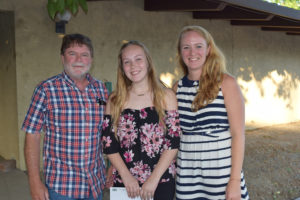California Humanist Awards $4K Good without God Scholarship
 Robert Nickelson, Good without God Scholarship winner Sarah Hagy, and Keeley Nickelson
Robert Nickelson, Good without God Scholarship winner Sarah Hagy, and Keeley Nickelson As high school seniors approach graduation, many are eager to learn about scholarship opportunities offered by local organizations and individuals. Often these scholarships are based around a particular interest or future career path. 4-H clubs offer scholarships to students who want to study agriculture or animal science, Rotary clubs give scholarships for students involved in community service, the Knights of Columbus provide scholarships to students attending Catholic colleges or universities, and so on. And many public high schools announce these scholarship opportunities to their graduating seniors.
Once he finished paying college tuition for his youngest child, Robert Nickelson began thinking about creating a scholarship opportunity for other students in his town of Winters, California. In Winters about thirty scholarships are announced and awarded through the public high school from a variety of sources, including local companies, agricultural associations, service organizations, and religious groups. Nickelson remembers, “I sat through the previous awards nights with my three daughters and watched kids get scholarships from religious organizations and many others. I believed they needed a sponsored scholarship from a humanist.”
So he and his family decided to establish the Good without God Scholarship, requiring the winner to submit an essay on one of the following subjects: being good without a god; secular versus theist issues; humanist thought and why it’s superior; non-faith living; the benefits of keeping religion out of public policy; or any related ideas educating about and promoting a nontheistic or secular society.
Nickelson, who identifies as a secular humanist but is not a member of the American Humanist Association, wanted to accomplish four goals through the scholarship:
- to give the deserving winner money for their future education at a public institution;
- to encourage the winner to declare herself/himself publicly as a humanist/secularist/nontheist;
- to create a written document about humanist/secular/nontheistic issues in a positive way; and
- to let the community know about nonreligious members of the community who are good without a god.
To accomplish the public part of these goals, Nickelson got the local newspaper, the Winters Express, to agree to publish the winning essay.
At first Nickelson offered an award of $2,500, but he didn’t receive any applications. So he increased the amount to $4,000, making it the largest scholarship announced through the school. Still, no one applied. Finally, he asked the school what they thought the problem was. It turned out they simply weren’t announcing the opportunity along with the other scholarships.
“They refused to advertise it for two months without notifying me. They buried it and didn’t tell me,” Nickelson says, adding that the superintendent tried to get him to change aspects of the essay topic. “His reasons made no sense,” he told me. “One that stuck out to me was he stated that the kids were just not ready for this type of scholarship, they were too young. It was nuts.”
Finally, after pushback from Nickelson, the school system agreed to announce the scholarship and suddenly he had six entries. He was impressed with their quality and selected Winters High School senior Sarah Hagy as the winner. “There were five other applicants of which two were outstanding. However, one applicant asked that her name not be used. That did not meet the requirements but still was an outstanding essay.”
Nickelson intends to continue the scholarship in future years and is contemplating doing some fundraising so he can increase the amount awarded. He says the feedback he’s gotten directly and over social media has been almost uniformly positive, aside from a comment or two about bribing kids to be atheists with the devil’s money.
All in all, it’s been a positive experience for him and his family. “The most important part of the story is that a young woman received a needed scholarship to continue her education” he says, adding that the most rewarding aspect was telling Hagy she’d won. “I could feel the joy and happiness in her voice. And announcing her as the winner and giving the check to her at the awards ceremony in front of her parents, teachers, students, friends, and foes: outstanding life moment.”
Read the winning essay by Sarah Hagy in the Winter’s Express.
